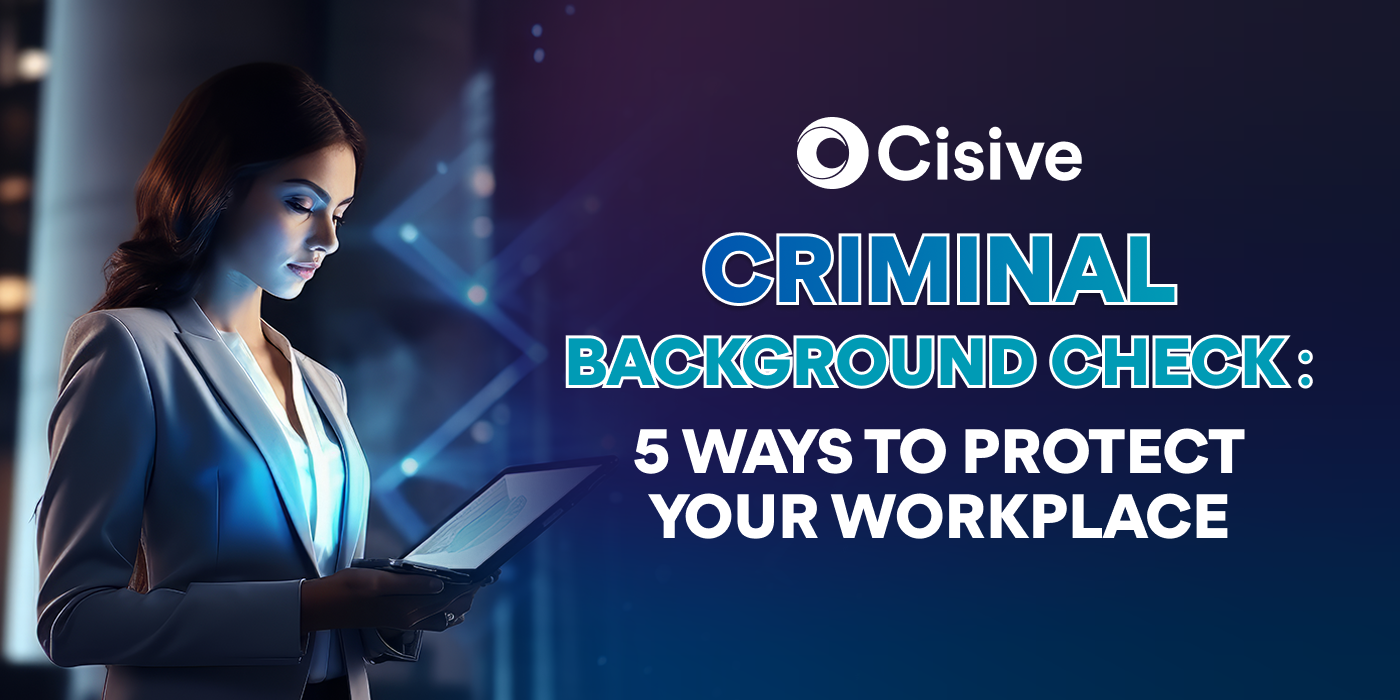
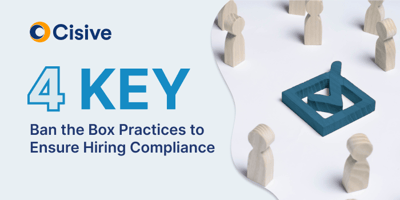
“Ban the box” laws have existed for more than 20 years and have taken effect across dozens of...

A safe work environment isn’t just about maintaining physical and digital safety. It also requires trusting the people you hire. Conducting criminal background checks for employment is an essential component of legal and ethical best practices. These checks mitigate risks, safeguard your reputation, and create a secure work environment.
Explore the intricacies of managing criminal background checks for employees, including knowing your legal obligations and best practices for incorporating compliant criminal background checks into your hiring process.
Top takeaways:
|
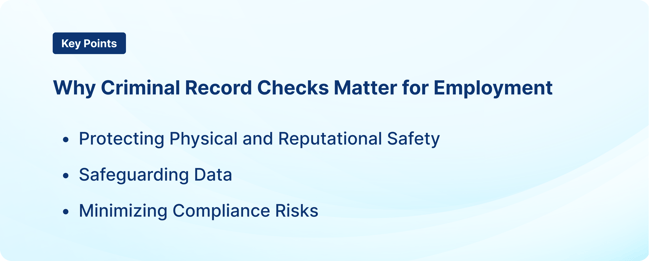
Pre-employment background checks have become an indispensable tool for employers seeking to make informed hiring decisions. These checks investigate a candidate's past, including criminal history, educational qualifications, employment records, and financial standing.
Employers use criminal record searches to verify that a candidate poses no danger to fellow employees, clients and customers, or the business.
Pre-employment criminal background screenings protect your organization by identifying disqualifying factors or potential risks to workplace safety. For instance, uncovering a candidate’s history of violence or theft through a criminal background check allows you to make an informed decision about their suitability for the job.
Pre-employment criminal background screenings safeguard your reputation by preventing hires who may draw negative attention or are at high risk of causing legal problems. For instance, hiring an employee with a history of embezzlement could result in financial losses and damage to the company's image. By utilizing background checks, you can mitigate these risks and maintain a safe and reputable work environment for employees and customers.
Background checks help companies identify criminal records or instances of misconduct that may pose a security threat to sensitive data. For instance, if a candidate has a history of identity theft or fraud, they may be more likely to engage in unethical behaviors such as stealing or misusing confidential information. By screening for these red flags, you reduce the risk of insider threats and other employee-involved data incidents.
Pre-employment criminal background screenings can also identify individuals with a history of cybercrimes or hacking. These individuals may have the technical skills and knowledge to bypass security measures and gain unauthorized access to sensitive data. For example, a candidate’s conviction for hacking into a company's database would be a red flag and warrant further investigation, especially when considering them for a position that involves sensitive data.
Criminal record checks help employers comply with legal requirements and industry standards. Federal, state, and local laws and regulations govern how and when employers should hire people with criminal records, for example, as well as outline how employers can inquire about such information.
Many highly regulated industries require employers to screen for specific disqualifying offenses. Financial institutions insured by the Federal Deposit Insurance Corporation (FDIC), for instance, must check that candidates have no history of fraud or financial abuse. Similarly, healthcare employers are required to screen candidates for a history of patient abuse or fraudulent activity related to Medicare or Medicaid, among other offenses. Many states specifically define what offenses an individual may not have if considered for employment providing certain types of care or if they will have patient access.
Criminal background checks must comply with applicable laws and regulations. Here are some federal, state, and local laws related to background reporting compliance to keep in mind when developing your criminal background check process.
In the United States, the primary federal law governing the use of criminal background checks for employment purposes is the Fair Credit Reporting Act (FCRA). Enacted in 1970, the FCRA is designed to protect the privacy and accuracy of consumer information, including criminal background records.
Under the FCRA, employers must obtain written authorization from individuals before obtaining a background check report. This authorization must be clear and conspicuous. It should inform the individual of the purpose of the background check and the type of information that will be collected.
Furthermore, employers must provide job applicants or employees with a copy of the background check report and a summary of their rights under the FCRA. This summary should detail the individual's right to dispute inaccuracies in the report and to receive a free copy upon request.
Information from criminal records can’t be used to discriminate against job applicants or employees based on race, color, religion, sex, national origin, age, or disability. The Equal Employment Opportunity Commission (EEOC) prohibits the use of criminal record information in a manner that has an adverse impact on protected groups.
State and local laws may further regulate the use of criminal history in an employment background check. Some jurisdictions have "ban the box" laws, which prevent employers from inquiring about criminal history record on job applications and sometimes further into the hiring process. State and local jurisdictions might limit the use of criminal record information in hiring decisions.
Adhering to the FCRA and other applicable laws helps employers conduct legal and nondiscriminatory criminal background checks. This protects job applicants and employees while reducing liability risks for employers.
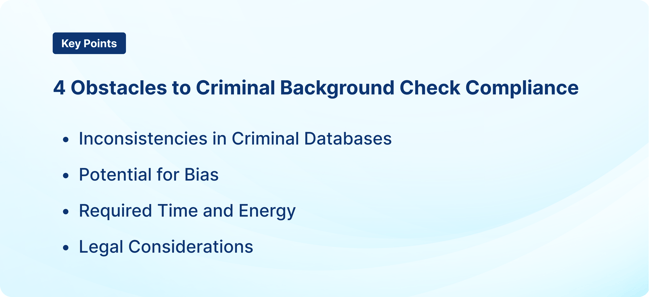
While criminal background checks are a crucial tool for employers, there are several obstacles that can hinder compliance. Here are some of the potential pitfalls to address in your criminal background check process.
Criminal background check reports may vary across locations because of differences in laws and regulations, as well as variations in how and when criminal records are reported. This can pose a challenge for employers that operate in multiple jurisdictions. Relying on these reports to make hiring decisions can be complicated, as you might receive inconsistent information and must navigate varying legal requirements.
Criminal background check database searches might contain inaccurate or inconsistent information because of data entry errors or outdated records. This can lead employers to inadvertently dismiss qualified candidates or hire people who pose risks to employees, customers, or the business.
Criminal background checks can perpetuate bias against certain groups by reinforcing negative stereotypes and assumptions. For example, employers might view certain demographics as an automatic risk if they have a criminal record, regardless of the nature of their offenses or their recent track record. Improper use of criminal background checks can lead to discrimination against candidates. When these groups are excluded from job opportunities, you perpetuate systemic inequalities and open yourself to legal and reputational risk.
To counter this risk, employers must be cautious not to use criminal record information in a discriminatory manner and must ensure that their hiring practices are fair and equitable.
Conducting criminal background checks can be a time-consuming and resource-intensive process. This can be particularly challenging for small businesses or organizations with limited resources. The time and resources required can be greater if your organization lacks the proper technology and record-keeping capabilities.
Employers must comply with a variety of federal, state, and local laws governing the use of criminal background checks in employment. Noncompliance can result in legal consequences, including lawsuits and financial penalties. Employers must also be mindful of individual privacy rights and protect the confidentiality of candidate information, including data related to any criminal record.
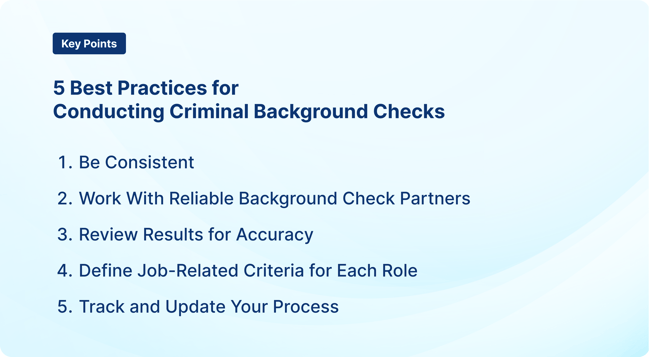
Ensuring a safe and reputable work environment requires conducting background checks that are accurate, effective, and comply with applicable laws and regulations. Here are best practices to consider.
Building a consistent background check process involves establishing clear guidelines and procedures. This process should include identifying the specific types of checks you’ll conduct — such as criminal searches, employment verification, and education verification — and ensuring they're fair and unbiased for all candidates.
Determine when in the hiring process you’ll conduct background checks based on applicable regulations and industry standards. Incorporate technology to improve consistency. Many HR workflow tools, for instance, will automatically trigger a check once an employer has made a conditional offer of employment.
Use job descriptions and relevant laws and regulations to define what information is automatically disqualifying during a pre-employment criminal background check. For example, a candidate’s criminal history that directly relates to the job duties or poses a security or safety risk should trigger further review. Additionally, patterns of criminal behavior or recent felony or misdemeanor convictions require further investigation.
Look for criminal background screening service partners with a reputation for accuracy and strong customer service. Look at their reviews and client testimonials for a sense of this.
Make sure your partner conducts background checks efficiently and effectively by using relevant databases and up-to-date technology. Screening providers should have access to national and local criminal records, as well as other relevant databases, such as a sex offender registry search.
Consider your background screening partner's level of expertise and experience in conducting criminal background checks. Ask about their processes and procedures, as well as certifications or accreditations. Cisive, for instance, is accredited through the Professional Background Screening Association (PBSA).
Find a partner with a demonstrated track record of confidentiality and compliance. They should be able to demonstrate how they obtain proper consent and that they carefully handle sensitive information.
Develop a clear and consistent policy for conducting background checks, including how you use that information in hiring decisions. Communicate your policies to all employees involved in the hiring process.
As required by U.S. law, provide applicants with an opportunity to explain any negative information found in their background checks. This allows candidates and employees to provide context or offer mitigating factors that the background check report alone doesn’t surface. Additionally, typos or other minor errors can creep into the background check process, leading to inaccurate results. When candidates are able to point out typos and other issues, your background screening partner can address them and reinitiate the check.
Additionally, the FCRA requires employers to notify candidates if they’re disqualified during the hiring process because of information in the background check. Employers must also provide these candidates with a copy of the report.
To keep the hiring background check process focused on job criteria, confirm that each role has clear and specific job requirements and qualifications. Create a detailed job description that outlines the necessary skills, experience, and education for the position. During the background check, include only information that’s relevant to these job criteria. Avoid asking for irrelevant or unrelated personal information.
The hiring team, likewise, should only consider information that's directly related to the job requirements. This will keep hiring decisions focused on the candidate's relevant qualifications and abilities rather than irrelevant or illegal factors, such as race, color, religion, sex, national origin, age, or disability.
To track the consistency of your process over time, implement a standardized procedure that includes documentation and regular reviews. This could involve creating a checklist or flowchart outlining each step of the screening process. By consistently following this procedure for each candidate, discrepancies or inconsistencies in the process can be easily identified and addressed.
Regularly review your screening process for relevance and compliance, and make updates as needed. Review recent changes in laws or emerging best practices related to background screenings.
Background screening partners play a crucial role in simplifying the criminal background check process and ensuring compliance for businesses.
By partnering with Cisive, employers can rely on our advanced technology and team of experts to streamline the screening process and protect their company from risk.
With our highly configurable solutions and 99.9994% accurate criminal background checks, we ensure a seamless and compliant hiring process for all clients.
Want to learn more? Schedule a call with one of our background screening experts.
Author: Dana Sangerhausen
Bio: VP at Cisive, Healthcare Solution Management.
Let's Connect on LinkedIn
“Ban the box” laws have existed for more than 20 years and have taken effect across dozens of...

Automatically disqualifying candidates with a criminal record can unfairly impact a qualified...
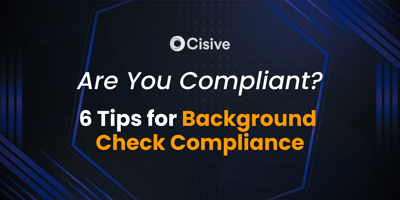
The Equal Employment Opportunity Commission (EEOC) has released its fiscal 2022-2026 strategic plan...